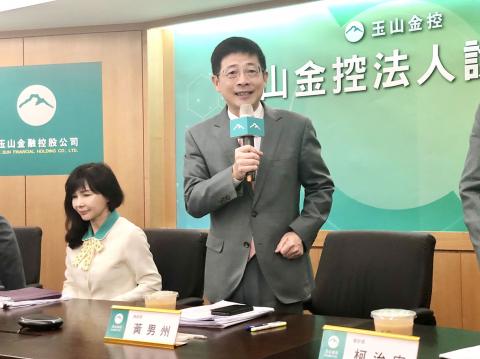E.Sun Financial Holding Co (玉山金控) yesterday posted a 10.5 percent year-on-year jump in net profit to NT$10.22 billion (US$324.58 million) for the first six months of this year on the back of growth in net fee income and lending to returning Taiwanese companies.
Earnings per share climbed to NT$0.94, compared with NT$0.91 a year earlier, company data showed.
E.Sun Bank (玉山銀行) contributed NT$10.14 billion, or 96.7 percent, of the conglomerate’s profit, while securities and venture capital units made up the remaining 3.3 percent, E.Sun Financial said.

Photo: Kelson Wang, Taipei Times
“This was the first time that E.Sun Financial and E.Sun Bank saw net profit surpass NT$10 billion for the January-to-June period,” E.Sun Financial president Joseph Huang (黃男州) told an investors’ conference in Taipei.
The company is upbeat that the momentum would continue in the second half of the year, as net profit last month rose 11 percent to NT$1.83 billion, or earnings per share of NT$1.11, Huang said.
In the first half of the year, revenue advanced 7 percent to NT$26.7 billion thanks to a 3.1 percent increase in net fee income to NT$8.66 billion, the highest for the period in the company’s history, company data showed.
Net fee income generated from the credit card business jumped 25 percent year-on-year, the data showed.
Huang attributed the increase to E.Sun Bank’s Pi mobile wallet app, which helped increase credit card spending by 19.1 percent to NT$205 billion and boost per card spending to a record-high NT$9,392 per month.
The bank’s total lending jumped 9.7 percent to NT$1.38 trillion in the first half thanks to a 14 percent surge in large corporate loans to NT$335.9 billion, company data showed.
“The bank has taken a decent share of the loan market,” Huang said.
However, he declined to reveal how much the bank had lent to local firms relocating manufacturing back to Taiwan from abroad.
Net interest income (including interest income from bond investments) gained 4.5 percent, as the bank was able to maintain its net interest margin at 1.36 percent, Huang said.
A falling Chinese yuan would have limited effects on the bank’s business, as most of its clients have chosen the US dollar for their foreign currency deposits and the US Federal Reserve late last year hiked its interest rates, E.Sun Financial chief financial officer Magi Chen (陳美滿) said.
On Monday, the yuan fell to less than 7 yuan per US dollar, but the Chinese currency is likely to rebound in the near term, as China still wants to continue negotiating with the US and solve their trade disputes, Chen said.
E.Sun Bank, which was the issuer of a credit card used to purchase a massive quantity of duty-free cigarettes during a presidential trip overseas last month that sparked a smuggling scandal, refused to comment on the transaction, citing the Money Laundering Control Act (洗錢防制法).

MARKET LEADERSHIP: Investors are flocking to Nvidia, drawn by the company’s long-term fundamntals, dominant position in the AI sector, and pricing and margin power Two years after Nvidia Corp made history by becoming the first chipmaker to achieve a US$1 trillion market capitalization, an even more remarkable milestone is within its grasp: becoming the first company to reach US$4 trillion. After the emergence of China’s DeepSeek (深度求索) sent the stock plunging earlier this year and stoked concerns that outlays on artificial intelligence (AI) infrastructure were set to slow, Nvidia shares have rallied back to a record. The company’s biggest customers remain full steam ahead on spending, much of which is flowing to its computing systems. Microsoft Corp, Meta Platforms Inc, Amazon.com Inc and Alphabet Inc are

Luxury fashion powerhouse Prada SpA has acknowledged the ancient Indian roots of its new sandal design after the debut of the open-toe footwear sparked a furor among Indian artisans and politicians thousands of miles from the catwalk in Italy. Images from Prada’s fashion show in Milan last weekend showed models wearing leather sandals with a braided design that resembled handmade Kolhapuri slippers with designs dating back to the 12th century. A wave of criticism in the media and from lawmakers followed over the Italian brand’s lack of public acknowledgement of the Indian sandal design, which is named after a city in the

The US overtaking China as Taiwan’s top export destination could boost industrial development and wage growth, given the US is a high-income economy, an economist said yesterday. However, Taiwan still needs to diversify its export markets due to the unpredictability of US President Donald Trump’s administration, said Chiou Jiunn-rong (邱俊榮), an economics professor at National Central University. Taiwan’s exports soared to a record US$51.74 billion last month, driven by strong demand for artificial intelligence (AI) products and continued orders, with information and communication technology (ICT) and audio/video products leading all sectors. The US reclaimed its position as Taiwan’s top export market, accounting for

INVESTOR RESILIENCE? An analyst said that despite near-term pressures, foreign investors tend to view NT dollar strength as a positive signal for valuation multiples Morgan Stanley has flagged a potential 10 percent revenue decline for Taiwan’s tech hardware sector this year, as a sharp appreciation of the New Taiwan dollar begins to dent the earnings power of major exporters. In what appears to be the first such warning from a major foreign brokerage, the US investment bank said the currency’s strength — fueled by foreign capital inflows and expectations of US interest rate cuts — is compressing profit margins for manufacturers with heavy exposure to US dollar-denominated revenues. The local currency has surged about 10 percent against the greenback over the past quarter and yesterday breached